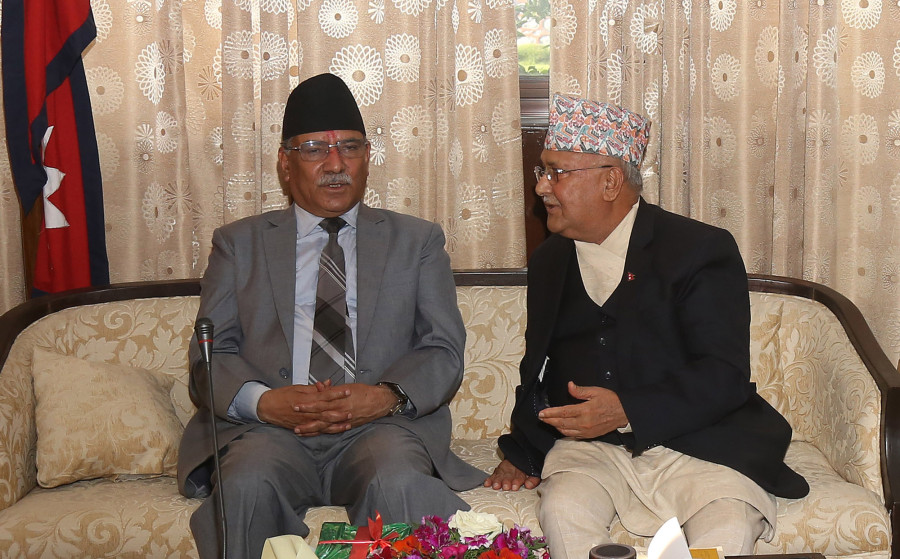Politics
NCP leadership’s highhandedness and indecision on Speaker show democratic disconnect
By imposing decisions on elected officials, who are the representatives of the people, the ruling party is ruining democratic principles, analysts and party insiders say.
Tika R Pradhan
Indecision on the Speaker candidate continued on Saturday, a day ahead of the scheduled House meeting, and the ruling Nepal Communist Party leadership decided to ask Shiva Maya Tumbahangphe to resign.
Deputy Speaker Tumbahangphe has staked her claim to the Speaker’s post, which has been vacant since early October after Krishna Bahadur Mahara stepped down following attempted rape allegations.
Though the decision to ask her to resign was taken by the party Secretariat, leaders said it came from Co-chairs KP Sharma Oli and Pushpa Kamal Dahal.
According to party insiders, the way decision-making has been absolutely reserved for the two top leaders shows not only a breakdown of the democratic process in the party but it also depicts the overall democratic disconnect.
The decision on seeking Tumbahangphe’s resignation is just the latest example. The ruling party, which has been emboldened due to a weak opposition, has also created democratic chaos on other issues, including the name and capital of Province 3.
Mani Thapa, a Standing Committee member, said centralism is prevailing in the party, with decision-making failing to go through the required democratic process.
Political analysts, however, said while the top leaders are to blame, Nepal Communist Party (NCP) members and its elected representatives—both at federal and provincial levels—are complicit in ruining democratic principles.
“While the infighting over the Speaker candidate has taken Parliament hostage, a handful of leaders in the ruling party have imposed their decision on the name and capital of Province 3,” said Rajendra Maharjan, a political commentator. “And elected officials have taken it lying down.”
According to Maharjan, in a democracy, the people have their voice, which is heard through elected officials, but when they act in a servile manner and grovel to the leadership, it disconnects the people from democracy.
“A functioning House means a platform where elected representatives raise concerns on behalf of the people,” said Maharjan. “But it looks like the co-chairs of the ruling party think whatever they decide is people’s voice.”
According to Maharjan, the ruling party is trying to govern with an iron fist. "It is against street protests. It wants to control media and it wants to curb freedom of expression. All these show the ruling party wants to keep the people at bay," said Maharjan.
The name and capital of Province 3 should have been decided by the provincial assembly, a body elected by the people. The constitution envisioned a decision on the name through the assembly members to ensure that the people’s voice is heard.
But the ruling party leaders are scared of people’s voices, said Krishna Pokhrel, a professor of political science at Tribhuvan University.
“For co-chairs of the ruling party, the Speaker’ post has now become a prestige issue,” Pokharel told the Post. “It’s unhealthy and toxic competition. Not only Parliament, the entire democratic exercise has been held hostage by their act.”
Party insiders admit privately that the real exercising of power has been limited to a handful of leaders, particularly the top two.
A Standing Committee member, who did not wish to be named, said almost all decisions are being made as per the will of the two leaders, or the two factions in the party for that matter. “And the will of the people has been completely ignored.”
Thapa said that the basic idea of federal democracy was taking the governance to the people’s doorsteps. “But the way our leaders are functioning shows they are taking democracy and governance away from the people,” Thapa told the Post. “Our leadership has failed to internalise the spirit of the federal democratic republic.”
As far as Tumbahangphe is concerned, the leadership’s reluctance to accept her as the new Speaker despite her repeated claims—she even made 12 points before the two co-chairs to prove why she deserves the post—not only shows the deeply entrenched patriarchy but also the leaders’ high-handedness.
If the leadership manages to wrest Tumbahangphe’s resignation, not only her, but the entire democratic process will be the casualty, according to the Standing Committee member.
“Decisions so far in the party have been taken for reasons of self-interest,” said Thapa. “According to the founders of communist parties, centralism in decision-making without democratic process is actually a dictatorship. And in a dictatorship, there is no democracy, because there are no people.”




 19.12°C Kathmandu
19.12°C Kathmandu















